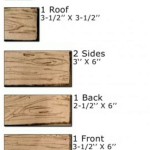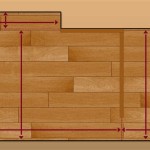Ceramic Tile Vs Laminate Flooring In Kitchen Design: Essential Considerations
When designing a kitchen, selecting the right flooring can significantly impact both the aesthetics and functionality of the space. Two popular choices for kitchen flooring are ceramic tile and laminate. Each option offers distinct advantages and drawbacks, making it crucial to understand their key differences to make an informed decision that aligns with your specific needs.
Durability and Maintenance
Ceramic tiles are renowned for their exceptional durability and resistance to wear, moisture, and staining. They are relatively easy to clean and maintain, requiring only regular sweeping and mopping. On the other hand, laminate flooring is made of compressed wood fiber with a wear-resistant surface. While it offers decent durability, it is more susceptible to scratches and dents than ceramic tile. Laminate flooring also requires careful maintenance and should not be exposed to excessive moisture, which can cause swelling and damage.
Water Resistance
Ceramic tiles are highly water-resistant and non-porous, making them an ideal choice for kitchens where water spills and moisture are common. They will not absorb liquids or stains, ensuring that the flooring remains intact over time. Laminate flooring, on the other hand, has a moisture-resistant surface but is not completely waterproof. Prolonged exposure to water can cause the core material to expand and buckle, resulting in damage.
Aesthetics and Design
Both ceramic tile and laminate flooring offer a wide range of design options. Ceramic tiles come in various colors, textures, and finishes, allowing for customization to match any kitchen style. They can create a classic, modern, or rustic look. Laminate flooring mimics the appearance of real wood, stone, or tiles, providing a realistic look at a more affordable price. It is available in a variety of colors and patterns, offering versatility in design.
Cost and Installation
The cost of flooring materials and installation varies depending on factors such as quality, style, and complexity of the layout. Ceramic tiles are generally more expensive than laminate flooring, but they also offer greater durability and longevity. Installation of ceramic tile is more labor-intensive and requires professional experience. Laminate flooring, on the other hand, is easier to install and can be done as a DIY project, saving on labor costs.
Conclusion
Choosing between ceramic tile and laminate flooring for your kitchen depends on your specific needs, budget, and design preferences. Both options have their advantages and drawbacks. Ceramic tile offers exceptional durability, water resistance, and a wide range of design choices. Laminate flooring is more affordable, easier to install, and provides a realistic wood or stone look. By carefully considering the factors discussed above, you can make an informed decision that will create a beautiful and functional kitchen flooring that meets your requirements.

Tile Vs Laminate Flooring Head To Forbes Home

Tile Vs Hardwood Floors In The Kitchen Calypso Country

Porcelain Wood Look Tile Vs Luxury Vinyl Plank An Honest Comparison

Tile Vs Wood Flooring Head To Forbes Home

13 Ideas For Upgrading Your Kitchen Floors Extra Space Storage

2024 Kitchen Flooring Trends 20 Ideas To Update Your Style Inc
:max_bytes(150000):strip_icc()/small-kitchen-ideas-mix-and-match-1021-99fbfaafe683423aa2af7d711d334e44-62f953ad7d5f4788995ecc3d72732509.jpeg?strip=all)
12 Kitchen Flooring Ideas From Traditional Tiles To Sustainable Cork

Best Kitchen Flooring Options Forbes Home

What Is The Best Flooring For A Kitchen Boss Design Center

10 Modern Kitchen Floors Ideas Lily Ann Cabinets
Related Posts








